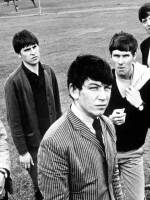Some years back, I was driving across the South with a German friend, leaving early Sunday morning from Athens, Ga., and heading to Louisiana. I turned on the radio and found a black church service in progress, and a woman with a remarkable voice singing. "Who's that?" my friend asked. I told him I had no idea. "But with a voice like that, she must be famous," he said. Some miles down the road, when the station had faded out, he still didn't believe me.

Of course, that's no reason to believe that she didn't make a record. Mike McGonigal, whose literary magazine Yeti mixes indie rock and literature, has been collecting gospel 45s on vanity and tiny independent labels for years, and in his spare time he's put out Fire in My Bones and This May Be My Last Time Singing, two triple-disc sets of amazing stuff from his collection. Some of it, like the Mississippi Nightingales' "Don't Let Him Ride," is fairly conventional, but some of it isn't.
Elder Roma Wilson and Family were a man and his three sons, all four of them playing harmonicas, recorded in 1948 at a Detroit record store on the track "Better Get Ready." They weren't even informed that their record had been released until McGonigal contacted them.
Most of these recordings are fairly obscure, but not all of them. Elder Beck's "Rock and Roll Sermon" has long been snickered over as a prime example of a preacher preaching against something that his band knows only too well. For a denunciation of rock 'n' roll, it rocks; in fact, rocking is all over these collections. Witness Little Ax and the Golden Echoes on the track "So Soon."
McGonigal has unearthed stories about most of these records, and he reports that Little Ax, who put in time with a lot of professional gospel groups, was named Wilmer Broadnax — although the word on the gospel circuit was that Wilmer was born Wilma and spent her entire life passing as a man.
These selections were from the Fire in My Bones collection, which includes not only independent recordings, but also a fair helping of ethnomusicological recordings. The fact that the follow-up collection, This May Be My Last Time Singing, is more narrowly focused on gospel 45s from 1957 to 1982 makes it even more exciting.
It's exciting, but that doesn't mean it's any more polished. Missionary Mamie Sample recorded "May Be My Last Time Singing" in New Orleans in 1972; it's an old Staples Singers song that's clearly fallen into the folk tradition — not to mention The Rolling Stones' repertoire. In fact, pop music, the blues and the church get pretty intertwined in some of these numbers.

The Masonic Travellers of Memphis, Tennessee recorded "If You Ever Need a Friend" for the J&W label, for which the song's writer, Willie Morganfield, was a producer. If his name seems familiar, it should be: He's one of Muddy Waters' sons.
I have to admit that I hope these two collections do very well — not just because McGonigal's a nice guy and he's done a fantastic job here, but because it might indicate that there's some interest in gospel. These records are fine in their own quirky way, but the vast majority of black gospel remains not only out of print, but inaccessible. Every big postwar independent label that recorded black music (Chess, Duke, Scepter and Jewel, to name just a few) had a gospel label on which the major, auditorium-filling acts recorded. The situation in gospel right now is like having all the 13th Floor Elevators' records in print while nobody can get to The Beatles' recordings. With the revival of interest in soul, it might be nice to let people hear where it — and most of its singers — came from.
Until then, I recommend these sets, with their odd mixture of sermons, songs and strangeness.
Copyright 2020 Fresh Air. To see more, visit Fresh Air.


